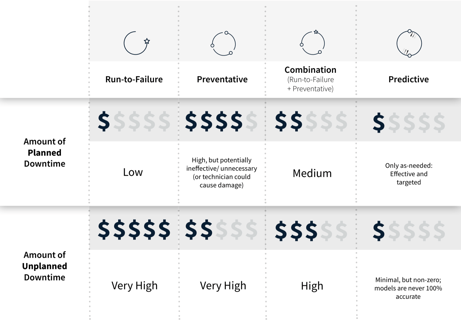In any capital-dependent industry, be it manufacturing, fleet management, or heavy machinery, the biggest headaches come when things stop working. With predictive maintenance, it’s possible to address these pain points before they ever see the light of day.

It is not enough simply to know when things go wrong. Predictive maintenance offers the opportunity to use advanced algorithms and machine learning to glean powerful insights about the lifecycle of the equipment being used. Rather than correcting problems once they occur, predictive maintenance lets you prevent problems from ever happening in the first place.
Looking at predictive maintenance in comparison to other methods of equipment maintenance, the benefits of this strategy are clear. With run-to-failure methods, low investment in maintenance leads to prohibitively high repair costs and downtimes once equipment does fail. With preventative strategies, constant, potentially unnecessary maintenance has very high costs without corresponding payoffs.

With predictive maintenance, both high repair costs and time spent unnecessarily doing maintenance are minimized. While models are not perfect, they offer the opportunity to make maintenance choices that are based on past trends and real-time data; it offers an entirely new cost-saving dimension.
Case Study
A great example of the power predictive maintenance in manufacturing comes from Essilor, the world’s leading ophthalmic optics company. Essilor designs, manufactures, and markets a wide range of lenses to improve and protect eyesight.

Ophthalmic lenses require very precise manufacturing processes in order to ensure that users are able to properly see.
By using artificial intelligence (AI) in a predictive maintenance process, Essilor was able to improve industrial performance. This is no easy feat for a company that employs 67,000 people worldwide and has 34 plants, 481 prescription laboratories and edging facilities, as well as four research and development centers around the world.




